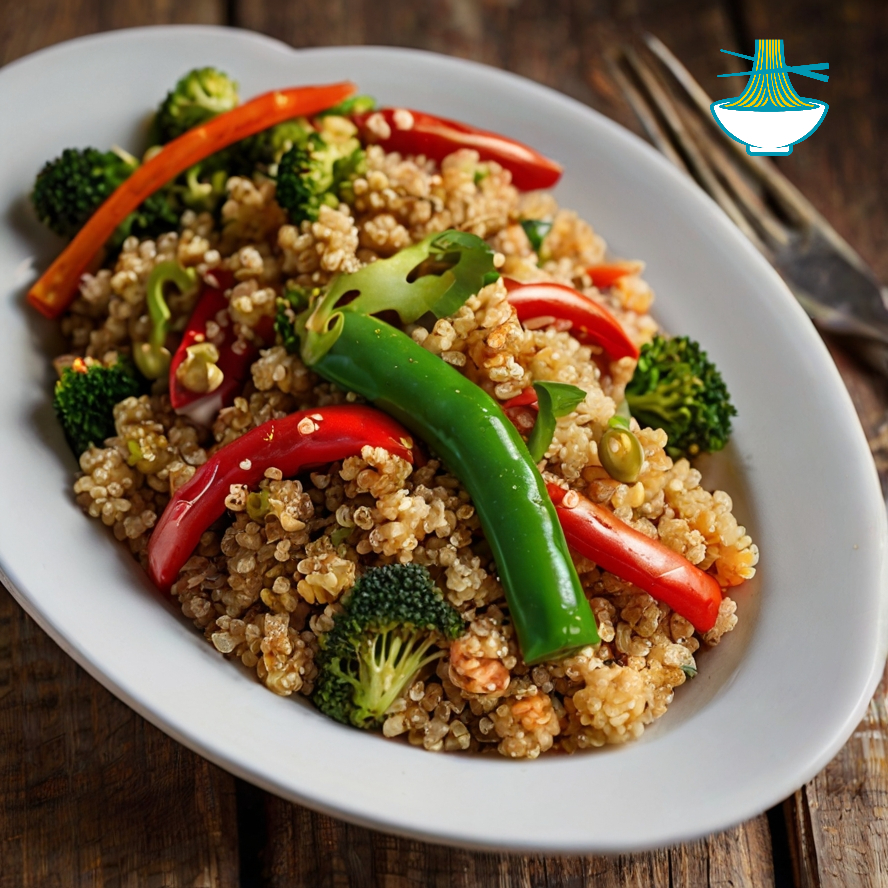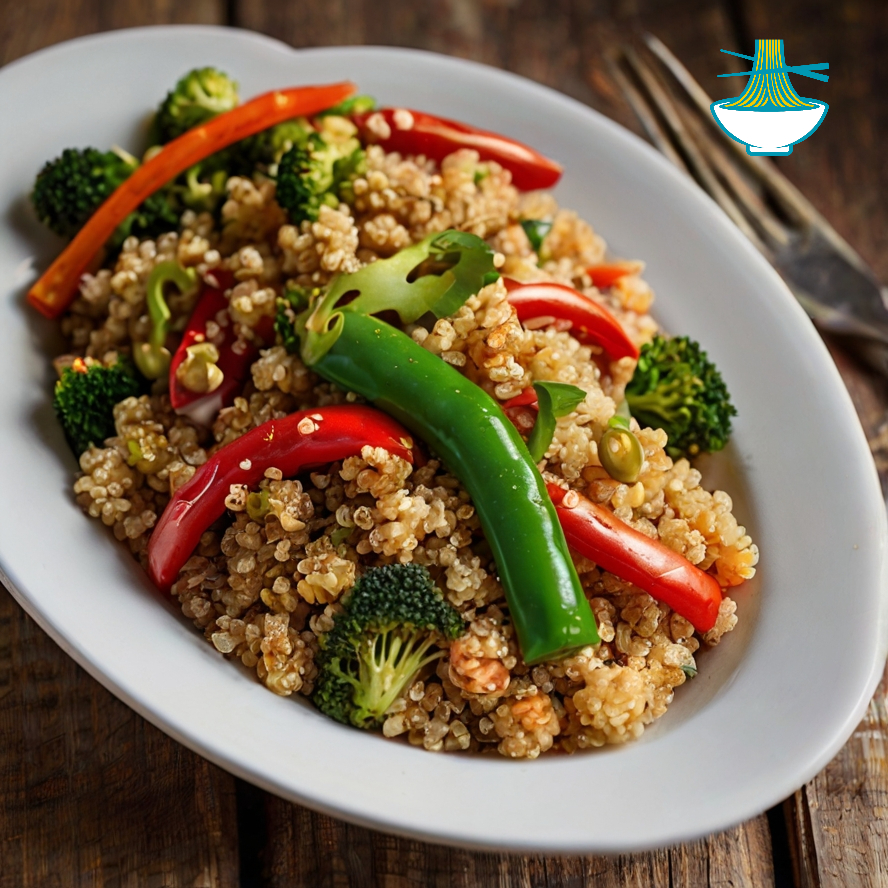This Quinoa and Vegetable Stir-Fry is a nutrient-packed dish designed to support heart health, especially for those managing high blood pressure. Quinoa, a complete protein, provides all essential amino acids, while the colorful vegetables contribute vital vitamins and minerals. The use of low-sodium soy sauce helps reduce sodium intake, supporting blood pressure regulation. This meal is high in fiber, potassium, magnesium, and antioxidants, making it an excellent choice for improving cardiovascular health.
The recipe merges two culinary traditions: stir-frying and quinoa. Stir-frying originated over 2,000 years ago in China as a fast and efficient way to cook fresh ingredients while preserving their nutrients. Quinoa, often referred to as the "mother grain," has been a staple in the Andean region of South America for over 5,000 years. This stir-fry combines these ancient methods and ingredients, offering a modern, heart-healthy meal that meets today’s dietary needs by focusing on reduced sodium and rich nutrient content.
Ingredients:
- 1 cup quinoa
- 2 cups low-sodium vegetable broth
- 1 tablespoon olive oil
- 1 red bell pepper, chopped
- 1 yellow bell pepper, chopped
- 1 zucchini, chopped
- 1 cup broccoli florets
- 2 cloves garlic, minced
- 1 teaspoon ginger, grated
- 1 tablespoon low-sodium soy sauce
- 1 tablespoon lemon juice
- 2 green onions, sliced
- 1/4 cup chopped fresh parsley
Instructions:
1. Rinse quinoa under cold water. Combine quinoa and vegetable broth in a medium saucepan. Bring to a boil, then reduce heat to low, cover, and simmer for about 15 minutes, or until quinoa is tender and liquid is absorbed.
2. In a large pan, heat olive oil over medium heat. Add bell peppers, zucchini, and broccoli. Sauté for 5-7 minutes until vegetables are tender.
3. Add garlic and ginger, and sauté for another 2 minutes.
4. Stir in cooked quinoa, soy sauce, and lemon juice. Cook for another 2-3 minutes until heated through.
5. Remove from heat and stir in green onions and parsley. Serve warm.
Nutrition Value:
1. 1 cup quinoa
- Calories: 222
- Carbohydrates: 39g
- Protein: 8g
- Fat: 4g
- Sodium: 13mg
- Cholesterol: 0mg
- Vitamins: B-complex, E
- Minerals: Magnesium, Iron, Potassium
- Nutritional Benefit: High in protein and fiber, helps in maintaining healthy blood sugar levels, and supports heart health.
2. 2 cups low-sodium vegetable broth
- Calories: 20
- Carbohydrates: 4g
- Protein: 1g
- Fat: 0g
- Sodium: 140mg
- Cholesterol: 0mg
- Vitamins: Varies (depends on the vegetables used)
- Minerals: Varies
- Nutritional Benefit: Low in calories and sodium, adds flavor and nutrients without extra fat.
3. 1 tablespoon olive oil
- Calories: 119
- Carbohydrates: 0g
- Protein: 0g
- Fat: 14g
- Sodium: 0mg
- Cholesterol: 0mg
- Vitamins: E, K
- Minerals: None
- Nutritional Benefit: Rich in monounsaturated fats, promotes heart health and reduces inflammation.
4. 1 red bell pepper, chopped
- Calories: 46
- Carbohydrates: 9g
- Protein: 1.5g
- Fat: 0.5g
- Sodium: 3mg
- Cholesterol: 0mg
- Vitamins: A, C, B6
- Minerals: Potassium, Folate
- Nutritional Benefit: High in antioxidants, supports immune function, and promotes healthy skin.
5. 1 yellow bell pepper, chopped
- Calories: 50
- Carbohydrates: 12g
- Protein: 1g
- Fat: 0g
- Sodium: 2mg
- Cholesterol: 0mg
- Vitamins: C, B6, A
- Minerals: Potassium, Folate
- Nutritional Benefit: Rich in vitamins and antioxidants, aids in immune support, and reduces the risk of chronic diseases.
6. 1 zucchini, chopped
- Calories: 33
- Carbohydrates: 7g
- Protein: 2g
- Fat: 0g
- Sodium: 16mg
- Cholesterol: 0mg
- Vitamins: A, C
- Minerals: Potassium, Manganese
- Nutritional Benefit: Low in calories, promotes digestion, and supports eye health.
7. 1 cup broccoli florets
- Calories: 31
- Carbohydrates: 6g
- Protein: 2.6g
- Fat: 0.3g
- Sodium: 30mg
- Cholesterol: 0mg
- Vitamins: C, K, A
- Minerals: Folate, Potassium, Iron
- Nutritional Benefit: High in fiber, antioxidants, and supports immune function and bone health.
8. 2 cloves garlic, minced
- Calories: 9
- Carbohydrates: 2g
- Protein: 0.4g
- Fat: 0g
- Sodium: 1mg
- Cholesterol: 0mg
- Vitamins: C, B6
- Minerals: Manganese, Selenium
- Nutritional Benefit: Known for its anti-inflammatory and immune-boosting properties.
9. 1 teaspoon ginger, grated
- Calories: 2
- Carbohydrates: 0.4g
- Protein: 0g
- Fat: 0g
- Sodium: 0mg
- Cholesterol: 0mg
- Vitamins: B6, C
- Minerals: Magnesium, Manganese
- Nutritional Benefit: Aids digestion, reduces nausea, and has anti-inflammatory effects.
10. 1 tablespoon low-sodium soy sauce
- Calories: 10
- Carbohydrates: 1g
- Protein: 1g
- Fat: 0g
- Sodium: 560mg
- Cholesterol: 0mg
- Vitamins: None
- Minerals: Iron, Potassium
- Nutritional Benefit: Provides umami flavor with less sodium, enhances the taste of dishes.
11. 1 tablespoon lemon juice
- Calories: 4
- Carbohydrates: 1g
- Protein: 0g
- Fat: 0g
- Sodium: 0mg
- Cholesterol: 0mg
- Vitamins: C
- Minerals: Potassium
- Nutritional Benefit: High in vitamin C, aids digestion, and supports immune health.
12. 2 green onions, sliced
- Calories: 10
- Carbohydrates: 2g
- Protein: 0.6g
- Fat: 0.1g
- Sodium: 2mg
- Cholesterol: 0mg
- Vitamins: A, C, K
- Minerals: Calcium, Iron
- Nutritional Benefit: Adds flavor and color, supports bone health, and enhances immune function.
13. 1/4 cup chopped fresh parsley
- Calories: 4
- Carbohydrates: 1g
- Protein: 0.3g
- Fat: 0.1g
- Sodium: 7mg
- Cholesterol: 0mg
- Vitamins: A, C, K
- Minerals: Iron, Calcium
- Nutritional Benefit: Rich in antioxidants, promotes healthy skin, and supports bone health.


Comments